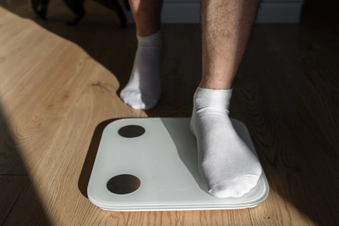Symptoms of hATTR With Polyneuropathy

Carpal Tunnel Syndrome
Many people with hereditary transthyretin amyloidosis (hATTR) with polyneuropathy have carpal tunnel syndrome, which can cause pain or numbness in your hands, weakness when you try to grip things, swollen fingers, or burning or tingling in your fingers. Carpal tunnel syndrome is often an early symptom. In one study, people with hATTR with polyneuropathy had signs of carpal tunnel syndrome an average of 10.4 years before they were diagnosed with hATTR.

Fatigue and Weight Loss
Early signs of hATTR with polyneuropathy may be hard to pinpoint. General tiredness and unexpected weight loss may be the first symptoms some people notice. Fatigue is very common. You may feel full after eating just a small amount of food, which can cause your weight to drop.

Numbness and Tingling in Feet
hATTR with polyneuropathy causes nerve damage, which you usually notice first in your feet. Your feet may feel numb or tingle, like a pins and needles sensation. This numbness can spread to your legs, trunk, and arms. Your skin may become less sensitive to temperature.

Pain in Feet, Legs, or Hands
You may feel general body pain, or pain in your hands, feet, or legs, due to nerve damage. It usually affects both sides of your body. As the disease goes on, you may notice that the pain moves from your extremities, like hands and feet, up through your legs or arms. You also may feel more sensitive to pain.

Constipation and Diarrhea
The disease can affect your gastrointestinal system. Damage to the nerves that control your organs may give you constipation or bad diarrhea, or you may alternate between the two. Some people with hATTR with polyneuropathy experience nausea and vomiting.

Dizziness Upon Standing
Because hATTR with polyneuropathy changes the nerves that control bodily functions, it can affect your heart rate and blood pressure. It's common to feel dizzy when you stand up quickly because of a sharp drop in your blood pressure.

Eye Problems
The disease can have an impact on your eyes. Many people with hATTR with polyneuropathy have dry eyes. You may notice floaters (little spots in your field of vision), pressure in your eyes, or changes to blood vessels in your eyes. Your pupils might start to look different. As the disease continues, it can weaken your vision.

Cognitive Challenges
hATTR can affect your mind as well as your body. Some people have memory loss, a hard time speaking, or trouble focusing. You may find it takes you a bit longer to process things than it did before.

Swelling
hATTR can affect your kidneys and cause a disorder called nephrotic syndrome. This causes your body to release too much protein when you pee and leads to swelling in your lower legs. Your stomach, arms, and lungs can also swell.

Loss of Fine Motor Skills
Weakness is a common symptom of hATTR with polyneuropathy. This can make it more difficult to grip items with your hands – like pens, phones, or the steering wheel of a car. You may have trouble opening jars or holding onto things without dropping them.

Trouble Walking
Muscle weakness, along with changes to your balance and muscle control, can also make it difficult to walk, bend over, or climb stairs, especially as the disease advances. Some people with hATTR use canes, walkers, or wheelchairs to help them get around.

Urinary and Sexual Problems
Some people with hATTR with polyneuropathy have repeated urinary tract infections caused by urinary retention, or when your bladder won’t empty entirely when you pee. The disease can damage the nerves that carry messages from your brain to your bladder, telling it to empty. Similarly, nerve damage from hATTR can cause sexual issues like erectile dysfunction in men and sexual arousal disorder in women.

Emotional Health
The symptoms of hATTR with polyneuropathy and the worsening nature of the disease can have a major effect on your emotional health and well-being. As your physical abilities change, the disease can alter your daily activities and social life. Many people with hATTR feel frustration, disappointment, sadness, or depression.
Show Sources
IMAGES PROVIDED BY:
- Moment/Getty Images
- Moment/Getty Images
- Moment/Getty Images
- E+/Getty Images
- iStock/Getty Images
- Moment/Getty Images
- Moment/Getty Images
- E+/Getty Images
- iStock/Getty Images
- iStock/Getty Images
- E+/Getty Images
- iStock/Getty Images
- E+/Getty Images
SOURCES:
Johns Hopkins Medicine: “Carpal Tunnel Syndrome.”
Neurology Clinical Practice: “Carpal tunnel syndrome and associated symptoms as first manifestation of hATTR amyloidosis.”
Therapeutics and Clinical Risk Management: “Diagnosis and Treatment of Hereditary Transthyretin Amyloidosis (hATTR) Polyneuropathy: Current Perspectives on Improving Patient Care.”
Journal of Patient-Reported Outcomes: “Patient-reported burden of hereditary transthyretin amyloidosis on functioning and well-being.”
Mount Sinai Journal of Medicine: “Amyloid Neuropathies.”
Amyloidosis Research Consortium: “Disease Overview: Hereditary Transthyretin Amyloidosis.”
Mayo Clinic: “Nephrotic syndrome.”
Clinical Autonomic Research: “Diagnosis and treatment of urinary and sexual dysfunction in hereditary TTR amyloidosis.”
Cleveland Clinic: “Urinary Retention.”